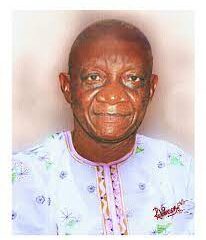Democracy & Governance
Re: Resignation of Political Appointees: Court Upholds BUHARI’S POSITION ON ELECTORAL ACT – Adesanya-Davies
It’s no more news that the Federal High Court in a sitting in Umuahia has struck down Section 84(12) of the newly amended Electoral Act which President Muhammadu Buhari had written to the National Assembly to delete.

A front line female presidential aspirant and the only Amazon on the platform of the People’s Democratic Party (PDP) in the upcoming 2023 election, Funmilayo Adesanya-Davies has commended ORDERS BY ATTORNEY GENERAL OF THE FEDERATION TO FORTHWITH DELETE SECTION 84(12) FROM THE ELECTORAL ACT, in a report by Newsroom Nigeria, on March 18, 2022, viz an interactive interview with Florence Akaakar, a Snr. lecturer at the Department of Public Law Faculty of Law Rivers State University.
Adesanya-Davies says, “Although Constitution Review refers to the act of modification and ulterration of the Constitution by way of some adjustments, addition or substitution as the case may be, because in fact, law was made by man and can be unmade and remade by man and there should be no powers and limits of the NASS lawmakers on the constitution.
However in this case, the rights of the appointees of government seeking to contest elections is being unfairly eroded which should not be. Secondly, in the constitution, the resignation of the appointees of government seeking to contest before the 30 days, need to be clarified, specified and stated in black and white whether it’s before the ‘Primary’ or ‘General election’.”
It’s no more news that the Federal High Court in a sitting in Umuahia has struck down Section 84(12) of the newly amended Electoral Act which President Muhammadu Buhari had written to the National Assembly to delete.
The court in a judgment delivered by Justice Evelyn Anyadike held that the section was unconstitutional, invalid, illegal, null, void and of no effect whatsoever and ought to be struck down as it cannot stand when it is in violation of the clear provisions of the Constitution.
It would be recalled that President Muhammadu Buhari had while signing the amended Electoral Act urged the National Assembly to delete the provision as it violated Constitution and breached the rights of government appointees. The President further wrote a letter to both Chambers of the National Assembly seeking amendment by way of deleting the provision an amendment the Senate rejected in plenary.
Justice Anyadike in the Suit marked FHC/UM/CS/26/2022 held that Sections 66(1)(f), 107(1)(f), 137(1)(f) and 182(1)(f) of the 1999 Constitution already stipulated that appointees of government seeking to contest elections were only to resign at least 30 days to the date of the election and that any other law that mandated such appointees to resign or leave office at any time before that was unconstitutional, invalid, illegal null and void to the extent of its inconsistency to the clear provisions of the Constitution.
Counsel to the Plaintiff Emeka Ozoani, SAN while addressing newsmen stated that by this judgment, the National Assembly is not required to further make any amendments to the section as the import of this judgment is that Section 84(12) of the Electoral Act is no longer in existence or part of the Electoral Act. The Judge thereafter ordered the Attorney General of the Federation to forthwith delete the said Subsection 12 of Section 84 from the body of the Electoral Act, 2022
On matters of 1999 Constitution, S. 84(12) of Electoral Act, Judgment of the Federal High Court, Umuahia: The facts to the questions, answered by Akinloye Oyeniyi may also contribute and serve as recommendation for further readings to the reader:
1. Can courts declare any section of any law made by the National Assembly invalid if such contravenes the Constitution?
Yes. Section 251(1q) of the Constitution is clear on this. It says the Federal High Court shall have and exercise jurisdiction in the operation and interpretation of the constitution in so far it affects the Federal Government or any of its agencies. Section 315(3) also gives jurisdiction to courts.
2. Can any law contravening any provisions of the constitution be voided?
Yes. Section 1(3) of the Constitution says the constitution is supreme and any law inconsistent with its provisions shall be void to the extent of such inconsistency.
3. Are laws inconsistent with the constitution invalid automatically?
No. The invalidity of such laws must be pronounced by a competent court (Federal High Court and Supreme Court) with jurisdiction depending on the parties involved.
In Ishola v. Ajiboye (1994) 7-8 SCNJ (Pt. 1) 1, (1994) 6 NWLR (Pt.352) 506, the Supreme Court held that the Constitution is not only supreme when another law is inconsistent with it, but also when another law seeks to compete with it in an area already covered by the Constitution.
4. Are there constitutional provisions on persons resigning to contest for elections?
Yes. For the presidential election, Section 137 (1) (g) of the 1999 Constitution (as amended) provides that “A person shall not be qualified for election to the office of the president if being a person employed in the civil or public service of the Federation or of any State, he has not resigned, withdrawn or retired from the employment at least thirty days before the date of the election.”
For election into the Senate or the House of Representatives, Section 66 (1) (f) of the Constitution says that “No person shall be qualified for election to the Senate or the House of Representatives if he is a person employed in the public service of the Federation or of any State and has not resigned, withdrawn or retired from such employment thirty days before the date of the election.”
For governorship election, Section 182 (1) (g) of the extant Nigerian Constitution states that “No person shall be qualified for election to the office of Governor of a State if being a person employed in the public service of the Federation or of any State, he has not resigned, withdrawn or retired from the employment at least thirty days to the date of the election.”
For membership of House of Assembly, Section 107 (1) (f) states clearly that “No person shall be qualified for election to a House of Assembly if he is a person employed in the public service of the Federation or of any State and he has not resigned, withdrawn or retired from such employment thirty days before the date of the election.”
5. Are political appointees employees in the public service of the Federation of any state?
No. According to Section 318(1) of the Constitution, public service of the Federation means the service of the federation in any capacity in respect of the Government of the Federation and includes:
a. Clerk or other staff of the National Assembly or of each House of the National Assembly;
b. Member of staff of the Supreme Court, the Court of Appeal, the Federal High Court, the High Court of the Federal Capital Territory, Abuja, the Sharia Court of Appeal of the Federal Capital Territory, Abuja, the Customary Court of Appeal of the Federal Capital Territory, Abuja or other courts established for the Federation by this Constitution and by an Act of the National Assembly;
c. Member of staff of any commission or authority established for the Federation by this Constitution or by an Act of the National Assembly;
d. Staff of any area Council;
e. Staff of any statutory Corporation established by an Act of the National Assembly;
f. Staff of any educational institution established or financed principally by the Government of the Federation;
g. Staff of any company or enterprise in which the Government of the Federation or its agency owns controlling shares or interest; and
h. Members or officers of the armed forces of the Federation or the Nigeria Police Force or other government security agencies established by law;
The Section also made like some provisions for public service of the state.
In OJONYE V. ONU & ORS(2018) LPELR-44223(CA), the Court held that political appointees hold office at the pleasure of the Chief Executive (appointor) and they are not public servants as provided for under the Constitution.
6. Is Section 84(12) of the Electoral Act, 2022 contravening any provisions of the Constitution.
No. The constitution made provision for persons deemed to be federal and state public service under Section 318(1) to resign at least 30 days before election.
It is also neither contravening the right to assemble freely and associate with other persons as provided in Section 40 nor the right to form a political party as provided for under Section 221 of the Constitution.
7. Is Section 84(12) of the Electoral Act 2022 the same as the constitutional provisions on at least 30 days before the elections?
No. Section 84(12) says “No political appointee at any level shall be a voting delegate or be voted for at the Convention or Congress of any political party for the purpose of the nomination of such persons or other candidates for any election.
Political appointees and persons in public service of the Federation and states are two classes of persons. While the those in public service have from the time preceding their party primaries to at least 30 days to election day to resign, the political appointees are to resign at no stipulated days but must do so before they can be voting delegates or be voted for in their party primaries or congresses.
8. Is there a difference in the Constitution and the Electoral Act provisions?
Yes. While the Constitution stipulates that public office holders resign “at least” 30 days before the elections they are interested in; which presupposes that such public officers could indeed resign earlier than the 30 days, the Electoral Act stipulates that political appointees resign before party primaries/congresses where candidates are to emerge.
9. Has the National Assembly negated the constitutional “at least 30 days” by Section 84(12) of the Electoral Act?
No. The National Assembly has only exercised its powers over where the constitution says it may cover, by stipulating a definitive time that such officials resign.
In Section 228(a) the constitution says it “…may by law provide guidelines and rules to ensure internal democracy within political parties, including making laws for the conduct of the party primaries, party congresses and party convention”
10. Are there laws on the matter before coming of the Section 84(12)?
Not really. Though political parties have always been having such in their party primary guidelines and persons have always been complying, but the All Progressives Congress (APC) took it further to give definite time for its aspiring party officials to vacate office before primaries/congresses. In Article 31(1)(iii) of its Constitution, the party states that “Any party office holder interested in contesting for an elective office (whether party office or office in general election) shall resign and leave office 30 days prior to the dare of nomination or party primary for the office he or she is seeking to contest”
11. Is the judgement of the Federal High Court, Umuahia valid; and are there ways out of it?
Yes until set aside. But the National Assembly, the political parties and civil society organisations can appeal within stipulated time against the ruling as interested parties whether gazetted or not.
The National Assembly and States assembly in future should also stipulate in the constitution, a definitive time for resignation of both public officials and political appointees before party primaries so as to create a level playing ground for all aspirants.
Read more
https://www.vanguardngr.com/2022/03/court-nullifies-section-8412-of-amended-electoral-act/
https://www.vanguardngr.com/2022/03/just-in-federal-high-court-orders-attorney-general-to-delete-section-8412-of-new-electoral-act/amp/
https://guardian.ng/news/electoral-act-2022-buhari-wins-as-court-voids-section-84-12/


















